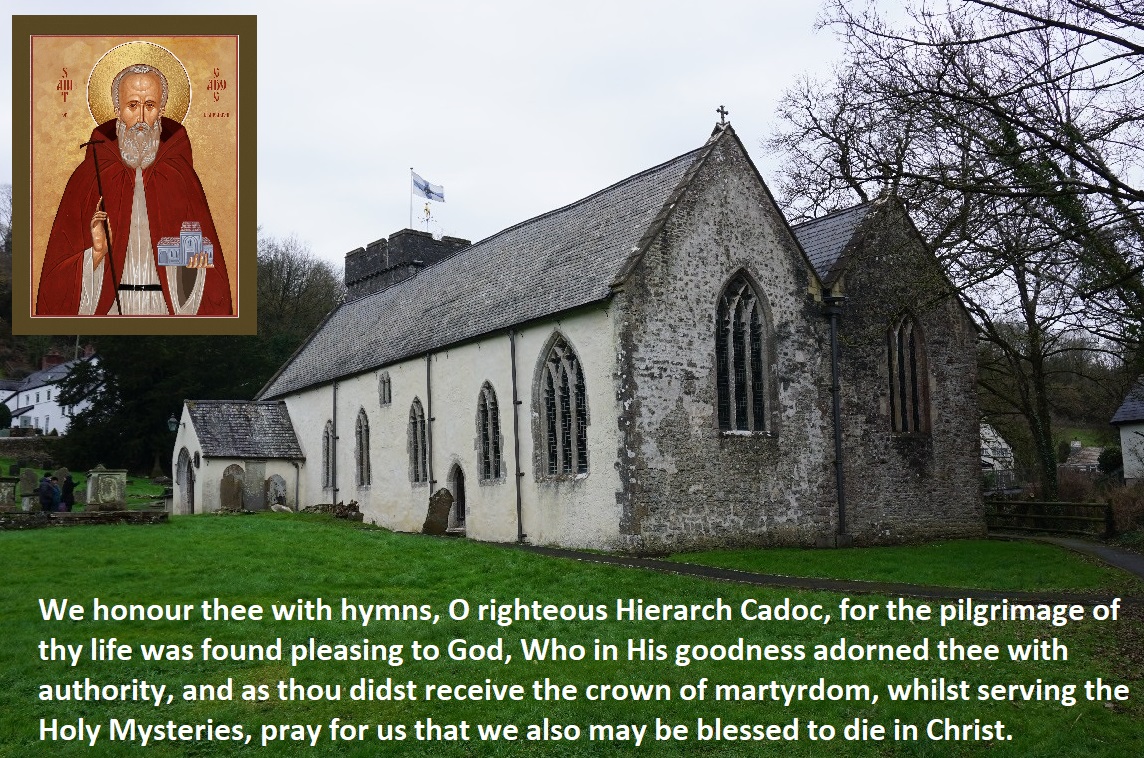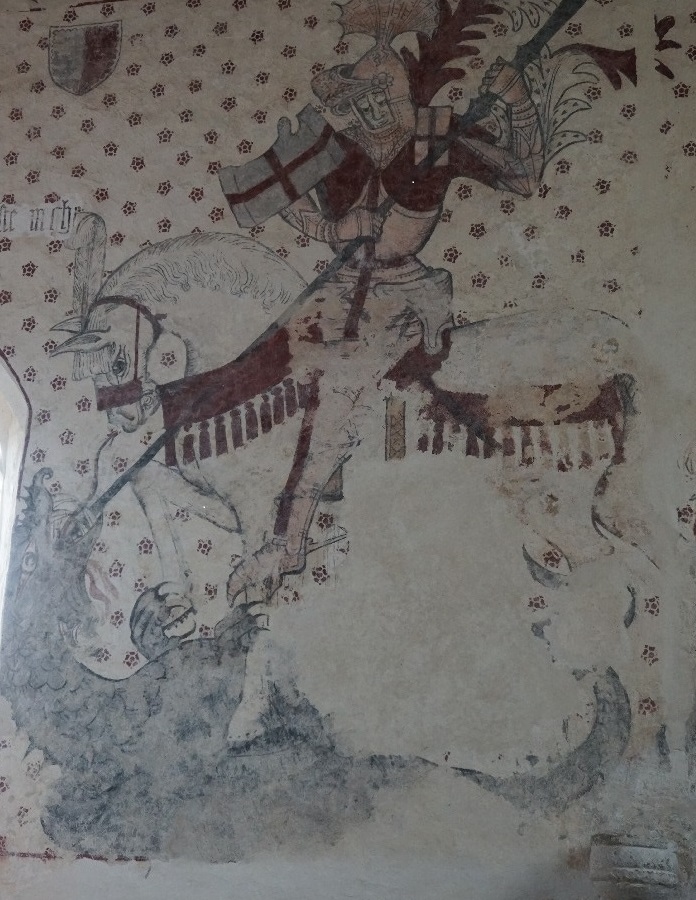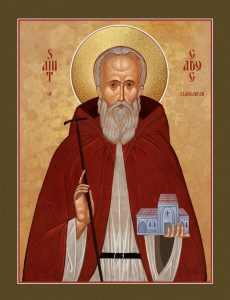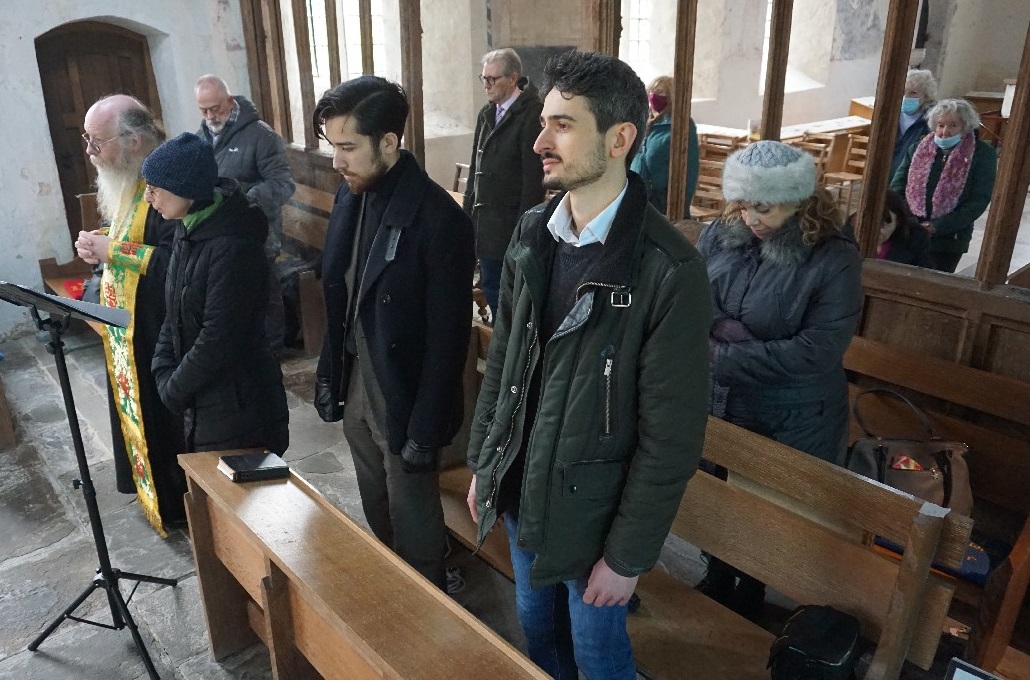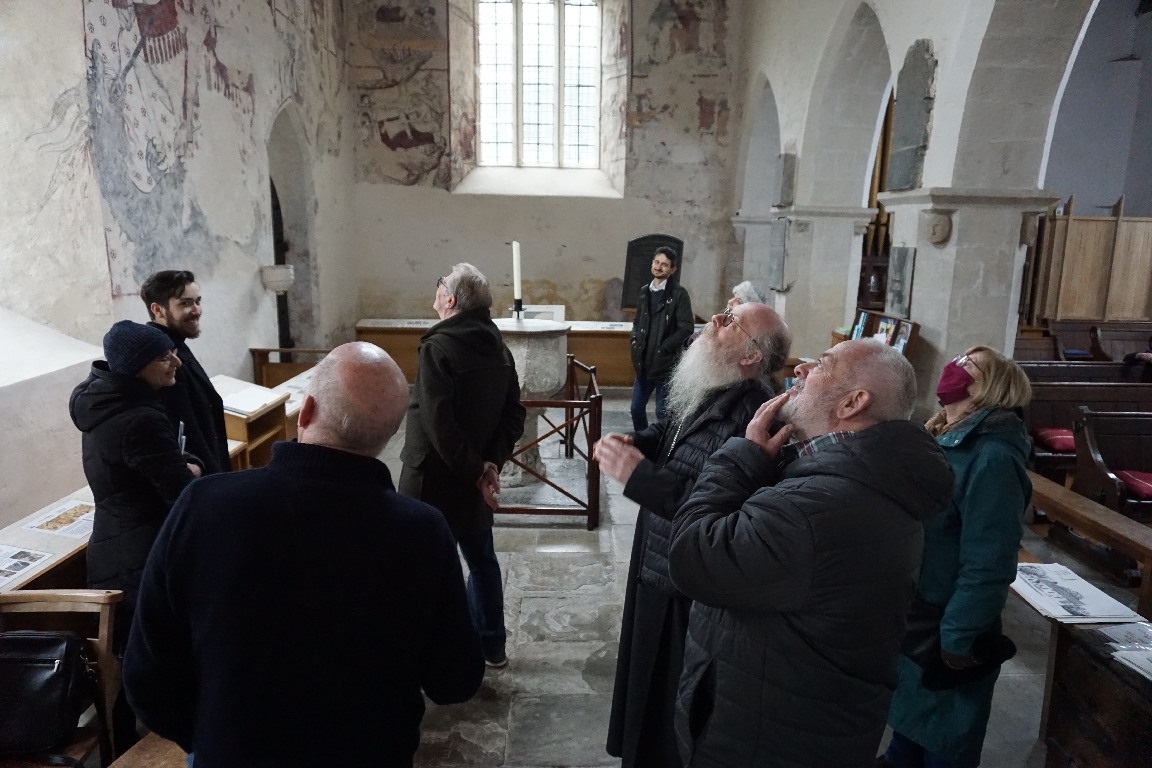Dear brothers and sisters,
Just to remind you that the parish pilgrimage to Llancarfan tomorrow will be at noon at St Cadoc’s Church, where we will serve a moleben in honour of St Cadoc’s Feast, which we will keep tomorrow, given that the feast of the New Martyrs and Confessors of Russia displaces Sunday’s commemorations.
The moleben text is below, and we will be celebrating this quite simply, given that it is our first visit – and hopefully, the first of many.
God bless – Fr Mark
MOLEBEN TO OUR VENERABLE FATHER CADOC
ABBOT OF LLANCARFAN
Priest: Blessed is our God always, now and ever, and unto the ages of ages.
Chanters: Amen. O Heavenly King, O Comforter, Spirit of Truth, Who art everywhere present and fillest all things, Treasury of good things and Giver of life, come and dwell in us, and cleanse us of all impurity, and save our souls, O Good One.
Reader: Holy God, Holy Mighty, Holy Immortal, have mercy on us. (Thrice)
Glory be to the Father and to the Son, and to the Holy Spirit; both now and ever, and unto the ages of ages. Amen.
O Most Holy Trinity, have mercy on us. O Lord, blot out our sins. O Master, pardon our iniquities. O Holy One, visit and heal our infirmities for Thy name’s sake.
Lord, have mercy. (Thrice)
Glory be to the Father and to the Son, and to the Holy Spirit; both now and ever, and unto the ages of ages. Amen.
Our Father, Who art in the heavens, hallowed be Thy name. Thy kingdom come, Thy will be done, on earth as it is in heaven. Give us this day our daily bread, and forgive us our debts, as we forgive our debtors; and lead us not into temptation, but deliver us from the Evil One.
Priest: For Thine is the kingdom and the power, and the glory: of the Father, and of the Son, and of the Holy Spirit, now and ever, and unto the ages of ages.
Reader: Amen. Lord, have mercy. (Twelve times)
Glory be to the Father and to the Son, and to the Holy Spirit; both now and ever, and unto the ages of ages. Amen
O come let us worship God our King.
O come let us worship and. fall down before Christ our King and God.
O come let us worship and fall down before Christ Himself, our King and God.
Psalm 142: O Lord, hear my prayer, give ear unto my supplication in Thy truth; hearken unto me in Thy righteousness. And enter not into judgment with Thy servant for in Thy sight shall no man living be justified. For the enemy hath persecuted my soul; he hath humbled my life down to the earth. He hath sat me in darkness as those that have been long dead, and my spirit within me is become despondent; within me my heart is troubled. I remembered days of old, I meditated on all Thy works, I pondered on the creations of Thy hands. I stretched forth my hands unto Thee; my soul thirsteth after Thee like a waterless land. Quickly hear me, O Lord; my spirit hath fainted away. Turn not Thy face away from me, lest I be like unto them that go down into the pit. Cause me to hear Thy mercy in the morning; for in Thee have I put my hope. Cause me to know, O Lord, the way wherein I should walk; for unto Thee have I lifted up my soul. Rescue me from mine enemies, O Lord; unto Thee have I fled for refuge. Teach me to do Thy will, for Thou art my God. Thy good Spirit shall lead me in the land of uprightness; for Thy name’s sake, O Lord, shalt Thou quicken me. In Thy righteousness shalt Thou bring my soul out of affliction, and in Thy mercy shalt Thou utterly destroy mine enemies. And Thou shalt cut off all them that afflict my soul, for I am Thy servant.
Glory be to the Father and to the Son, and to the Holy Spirit.
Chanters: Both now and ever, and unto the ages of ages. Amen. / Alleluia, alleluia, alleluia. Glory to Thee, O God. (Thrice)
And God is the Lord: tone 4: God is the Lord, and hath appeared unto us. Blessed is he that cometh in the name of the Lord.
Stichos 1: O give thanks unto the Lord, for He is good, for His mercy endureth for ever.
Chanters: God is the Lord…
Stichos 2: Surrounding me they compassed me, and by the name of the Lord I warded them off.
Chanters: God is the Lord…
Stichos 3: 1 shall not die, but live, and I shall tell of the works of the Lord.
Chanters: God is the Lord…
Stichos 4: The stone which the builders rejected, the same is become the head of the comer. This is the Lord’s doing, and it is marvellous in our eyes.
Chanters: God is the Lord…
Troparion of St. Cadoc, Tone 5: Having been raised to piety, O Hierarch Cadoc,/ thou didst dedicate thy life to God,/ serving Him in the monastic state./ As with joyful heart thou didst fulfil thy daily obedience,/ caring for the earthly needs of countless paupers,/ look now upon our spiritual poverty/ and beseech Christ our God,/ that He will grant us great mercy. (Twice)
Glory be to the Father and to the Son, and to the Holy Spirit; both now and ever, and unto the ages of ages. Amen.
Tone 5: Rejoice, impassible gate of the Lord! / Rejoice, rampart and protection of those who have recourse unto thee! / Rejoice, haven untouched by storms, / thou that knowest not wedlock, / who gavest birth in the flesh to thy Creator and God! / fail not in thy supplications // for those who hymn and venerate thy birthgiving!
Reader – Psalm 50: Have mercy on me, O God, according to Thy great mercy; and according to the multitude of Thy compassions blot out my transgression. Wash me thoroughly from mine iniquity, and cleanse me from my sin. For I know mine iniquity, and my sin is ever before me. Against Thee only have I sinned and done this evil before Thee, that Thou mightest be justified in Thy words, and prevail when Thou art judged. For behold, I was conceived in iniquities, and in sins did my mother bear me. For behold, Thou hast loved truth; the hidden and secret things of Thy wisdom hast Thou made manifest unto me. Thou shalt sprinkle me with hyssop, and I shall be made clean; Thou shalt wash me, and I shall be made whiter than snow. Thou shalt make me to hear joy and gladness; the bones that be humbled, they shall rejoice. Turn Thy face away from my sins, and blot out all mine iniquities. Create in me a clean heart, O God, and renew a right spirit within me. Cast me not away from Thy presence, and take not Thy Holy Spirit from me. Restore unto me the joy of Thy salvation, and with Thy governing Spirit establish me. I shall teach transgressors Thy ways, and the ungodly shall turn back unto Thee. Deliver me from blood-guiltiness, O God, Thou God of my salvation; my tongue shall rejoice in Thy righteousness. O Lord, Thou shalt open my lips, and my mouth shall declare Thy praise. For if Thou hadst desired sacrifice, I had given it; with whole-burnt offerings Thou shalt not be pleased. A sacrifice unto God is a broken spirit; a heart that is broken and humbled God will not despise. Do good, O Lord, in Thy good pleasure unto Sion, and let the walls of Jerusalem be builded. Then shalt Thou be pleased with a sacrifice of righteousness, with oblation and whole-burnt offerings. Then shall they offer bullocks upon Thine altar.
Ode 1, Irmos: Having passed through the water as upon dry land, * and having escaped the malice of the Egyptians, * the Israelites cried aloud: * Unto our God and Redeemer let us sing.
Refrain: Venerable Father, Cadoc, pray to God for us
From thy youth thou wast adorned with goodly moral qualities, cleaving unto Christ, and mortifying the passions of the flesh with abstinence and fasting, thou hast passed over unto life, O venerable one.
Refrain: Venerable Father, Cadoc, pray to God for us
O most wise Father, being a doer of the divine sayings and laws, thou hast been blessed with divine gifts and miracles, wherefore all are richly illumined with thy splendour.
Refrain: Venerable Father Cadoc, pray to God for us
Strengthened by Christ, thou, O Father, subdued the might and power of the enemy, wherefore in honour of thy victory thou hast been rewarded with the gift of miracles, O venerable one.
Refrain: Glory be to the Father and to the Son, and to the Holy Spirit.
Possessing a clear conscience, and directing the eye of thy heart towards God O most wise one, God, in answer to thy prayers, hath numbered thee among the just.
Refrain: Both now and ever, and unto the ages of ages. Amen.
I implore thee, O most pure Virgin, subdue the passions of my flesh and quieten the beguiling thoughts of my mind, and do thou thyself set me upon the right path.
Ode 3, Irmos: O Lord, thou art the confirmation of those who flee to Thee, * Thou art the Light of those in darkness, * and my spirit doth hymn Thee.
Refrain: Venerable Father, Cadoc, pray to God for us
Altogether devoted to the Almighty, thou, O most wise venerable Father, didst escape all the wiles of the demons, and adorned with the loftiest humility, by thy most excellent works, thou didst overcome the proud boaster.
Refrain: Venerable Father, Cadoc, pray to God for us
While still in the flesh thou, O most wise Father, shamed the stiff-neckedness of the wicked one by thy humble instructions.
Refrain: Glory be to the Father and to the Son, and to the Holy Spirit.
Having the grace of God as thine effectual helper, thou, O most wise and wondrous father, wast granted the gift of miracles, driving away diseases.
Refrain: Both now and ever, and unto the ages of ages. Amen.
In becoming incarnate, the Creator found an abode within thy womb, O all-immaculate one, unto the profit of those who with faith hymn thee.
Katavasia: Pray to God for us, O holy father, Cadoc, for we fervently flee unto thee, the speedy helper and intercessor for our souls.
Then the priest says the ectenia: Have mercy upon us, O God…
Sessional Hymn, Tone 4: Spec. Mel.: “Go thou quickly before …”: Vanquishing the fleshly subtlety of the passions through fasting, * thou didst make the weaker subject unto the better, * O most glorious Father Cadoc, * and thereby destroyed the scheming of the enemy. * In the brilliant radiance of thy virtues thou didst shine forth in the world * as a beacon of divine light; ** Wherefore we ever hymn thee.
Glory be to the Father and to the Son, and to the Holy Spirit; both now and ever, and unto the ages of ages. Amen.
Theotokion, Tone 4: O Virgin Theotokos, * thou art an invincible wall for all Orthodox Christians. * For having recourse unto thee we remain unharmed * and in thee we have a sure intercessor for the forgiveness of our sins; * wherefore rendering thanks unto thee, we cry aloud! ** Rejoice, O thou who art full of grace, the Lord is with thee.
Stavrotheotokion: O most immaculate Virgin, * Mother of Christ God, * a sword pierced thy most holy soul * when thou didst behold thy Son and God * crucified of His own will. * Him do thou never cease to entreat, O blessed one, ** that He grant us the forgiveness of our transgressions.
Ode 4, Irmos: O Lord, I have heard the mystery of Thy dispensation; * I have considered Thy works, * and I have glorified Thy Divinity.
Refrain: Venerable Father, Cadoc, pray to God for us
Making thy soul a temple of the Holy Spirit, thou didst become an heir of the Heavenly Kingdom, together with the hosts on high.
Refrain: Venerable Father, Cadoc, pray to God for us
Thou dost ever relieve the suffering of those who, afflicted with manifold infirmities, have recourse unto thee; for thou, O venerable one, hast obtained from the Lord the grace to work wonders and miracles.
Refrain: Glory be to the Father and to the Son, and to the Holy Spirit.
Thou, O Father, sprouted forth like a preeminent blossom in the temple of God, adorned with virtues and filled with the sweet fragrance of grace-filled fruit.
Refrain: Both now and ever, and unto the ages of ages. Amen.
Thou, O Ever-Virgin art a truly spiritual field, for from thy furrow thou didst bring forth the fruit that doth feed the whole of creation, the God of all.
Ode 5, Irmos: Rising early we cry to Thee, O Lord; * save us, for Thou art our God, * and we know none other besides Thee.
Refrain: Venerable Father, Cadoc, pray to God for us
With thy mind purified, O most glorious one, thou didst behold the ineffable goodness of Christ, the God of all.
Refrain: Venerable Father, Cadoc, pray to God for us
Like unto Elijah, thou, O Father, aided by the Holy Spirit, ascended into heaven on the chariot of thy virtues.
Refrain: Glory be to the Father and to the Son, and to the Holy Spirit.
Having withered thy body with abstinence and attained bodily purity, thou, O Father, didst ascend unto the fullness of the loftiest abodes on high.
Refrain: Both now and ever, and unto the ages of ages. Amen.
Heal the blindness of my polluted mind, O all-immaculate Lady for thou hast given birth unto Christ the great Physician.
Ode 6, Irmos: I will pour out my prayer unto the Lord, * and to Him will I proclaim my grief; * for my soul is filled with evils, * and my life unto Hades hath drawn nigh, * and like Jonah I pray unto Thee: * Raise me up from corruption, O God.
Refrain: Venerable Father, Cadoc, pray to God for us
By thy sacred prayers, O thou who art blessed by God, the cunning serpent hath been slain and the malice of those who demanded of thee a sign hath been destroyed, for thou, as one favoured by God, art effulgent with the light of the Godhead in thine unshakable faith.
Refrain: Venerable Father, Cadoc, pray to God for us
Assiduously ploughing the fields of thy soul, and most wisely sowing the diversely fruitful seeds of virtues, thou, O sacred Father, hast harvested the rich bounty of abundant healings.
Refrain: Glory be to the Father and to the Son, and to the Holy Spirit.
Helped, O holy Father, by the strength of the Spirit, thou hast subdued the might and power of the enemy, and in honour of thy victory thou hast been rewarded, O holy one, with the effulgent gift of miracles.
Refrain: Both now and ever, and unto the ages of ages. Amen.
The Lord is with thee, O most pure one! As it was well pleasing to Him, to be with thee O Maiden, so by thine intercessions, He hath delivered us all from the reign of the deceitful one; wherefore as is meet, from generation to generation we call thee blessed.
Katavasia: Pray to God for us, O holy father, Cadoc, for we fervently flee unto thee, the speedy helper and intercessor for our souls.
Then the priest says the ectenia: Have mercy upon us, O God…
Kontakion of St. Cadoc, Tone 5: We honour thee with hymns, O righteous Hierarch Cadoc,/ for the pilgrimage of thy life was found pleasing to God,/ Who in His goodness adorned thee with authority,/ and as thou didst receive the crown of martyrdom,/ whilst serving the Holy Mysteries,/ pray for us that we also may be blessed to die in Christ.
Ikos: Having conceived within thyself a loving attachment to the divine commandments of Christ, and a hatred for the delights of this world, with diligence thou didst achieve thy God-pleasing goals, like a divine lamp enlightening the ends of the world with spiritual radiance. Wherefore falling down before thee I implore thee: Enlighten my spiritual eyes that I may worthily hymn thine endeavours of fasting, thy watchfulness, the shedding of thy tears, thy labours and the emaciation of thy body, all for the sake of a blessed future life, which thou dost now enjoy; do thou ever pray for us who celebrate thy holy memory!
Ode 7, Irmos: The Children of Judaea, * who of old came to dwell in Babylon, * trampled underfoot the flame of the furnace * through their faith in the Trinity, * as they sang: “O God of our fathers, blessed art Thou.”
Refrain: Venerable Father, Cadoc, pray to God for us
Having with great resolve completed thine exploits of fasting, thou, O Father, hast humbled the proudest of minds by thy divine humility, singing: “O God of our fathers, Blessed art Thou”.
Refrain: Venerable Father, Cadoc, pray to God for us
Thou, O Father, sprouted forth like a preeminent blossom in the temple of God, adorned and filled with the sweet fragrance of the grace-filled fruits of virtue.
Refrain: Glory be to the Father and to the Son, and to the Holy Spirit.
Having enlightened thy heart, O Father, thou wast made the guide of thy sacred assembly, giving them spiritual direction, teaching them and rousing them all to fulfil the will of God, singing: “O God of our fathers, Blessed art Thou”.
Refrain: Both now and ever, and unto the ages of ages. Amen.
Giving birth to a new Child, the beginningless Word, thou, O Virgin, hast renewed us who have grown old through sin, and granted us strength to sing: “O God of our fathers, Blessed art Thou”.
Ode 7, Irmos: Treading down the fiery flame in the furnace, * the divinely eloquent children sang: * “Bless the Lord, ye works of the Lord”.
Refrain: Venerable Father, Cadoc, pray to God for us
As an heir of the divine habitations, thou, O Father, didst live like an angel; wherefore with the Angels thy spirit rejoiceth.
Refrain: Venerable Father, Cadoc, pray to God for us
O most wise and right wondrous Father, without wavering thou didst proceed along the divine paths leading to heaven, and thou didst, even unto the end, avoid those that lead to perdition.
Refrain: Glory be to the Father and to the Son, and to the Holy Spirit.
Through the grace which found an abode in thy soul, O Father, the unclean spirits that cunningly find their abode in mortals, are driven away.
Refrain: Both now and ever, and unto the ages of ages. Amen.
Thou, O Virgin, art an inexhaustible source of spiritual water, drinking of which we all are filled with grace, and cleansed in both soul and body.
Ode 9, Irmos: All are awestruck at hearing of God’s ineffable condescension, * for the Most High voluntarily descended and assumed flesh, * becoming man in the Virgin’s womb; * wherefore we the faithful magnify the most pure Theotokos.
Refrain: Venerable Father, Cadoc, pray to God for us
By the action of the Holy Spirit thine honoured relics shed forth healings, curing the long standing diseases of those who have recourse unto thee, O Father; driving away cunning ferocious spirits, and raising the faithful to praise thy splendid deeds.
Refrain: Venerable Father, Cadoc, pray to God for us
Like a great sun that shineth forth with the majesty of thine ascetic deeds, O godly-wise one, thou hast enlightened the ends of the earth, and in thy death hast been exalted from light unto a most effulgent light; wherefore we cry unto thee: Enlighten our thoughts, O holy Father Cadoc.
Refrain: Venerable Father, Cadoc, pray to God for us
By touching thine enduring body resplendent with ascetic endeavours, O blessed one, incurable diseases are healed, for our God and Saviour hath greatly glorified thee O most wise and wonder-worthy Father Cadoc; wherefore, for thy good works, thou art showered with fame, O holy one.
Refrain: Glory be to the Father and to the Son, and to the Holy Spirit.
In the hollows of fasting hast thou, O most praised Father, blossomed like a sweet-smelling rose, and like a lily hast thou filled the consciences of the faithful with the fragrances of thy virtues and miracles; wherefore, O holy one, drive away from us putrid passions.
Refrain: Both now and ever, and unto the ages of ages. Amen.
Enlighten, O pure Virgin, my heart ever grieving from my transgressions and the multitude of worldly distractions, and never leave me to mine enemies, that I may glorify and with love hymn thee, O all-hymned one.
And then: It is truly meet to bless thee, O Theotokos, ever-blessed and most immaculate, and the Mother of our God. More honourable than the Cherubim, and beyond compare more glorious than the Seraphim, who without defilement gavest birth to God the Word, the true Theotokos, thee do we magnify.
Reader: Holy God, Holy Mighty, Holy Immortal, have mercy on us. (Thrice)
Glory be to the Father and to the Son, and to the Holy Spirit; both now and ever, and unto the ages of ages. Amen.
O Most Holy Trinity, have mercy on us. O Lord, blot out our sins. O Master, pardon our iniquities. O Holy One, visit and heal our infirmities for Thy name’s sake.
Lord, have mercy. (Thrice).
Glory be to the Father and to the Son, and to the Holy Spirit; both now and ever, and unto the ages of ages. Amen.
Our Father, Who art in the heavens, hallowed be Thy name. Thy kingdom come, Thy will be done, on earth as it is in heaven. Give us this day our daily bread, and forgive us our debts, as we forgive our debtors; and lead us not into temptation, but deliver us from the Evil One.
Priest: For Thine is the kingdom and the power, and the glory: of the Father, and of the Son, and of the Holy Spirit, now and ever, and unto the ages of ages.
Reader: Amen.
Troparion, Tone 5: Having been raised to piety, O Hierarch Cadoc,/ thou didst dedicate thy life to God,/ serving Him in the monastic state./ As with joyful heart thou didst fulfil thy daily obedience,/ caring for the earthly needs of countless paupers,/ look now upon our spiritual poverty/ and beseech Christ our God,/ that He will grant us great mercy.
Glory be to the Father and to the Son, and to the Holy Spirit; both now and ever, and unto the ages of ages. Amen.
Kontakion, Tone 5: We honour thee with hymns, O righteous Hierarch Cadoc,/ for the pilgrimage of thy life was found pleasing to God,/ Who in His goodness adorned thee with authority,/ and as thou didst receive the crown of martyrdom,/ whilst serving the Holy Mysteries,/ pray for us that we also may be blessed to die in Christ.
Then the priest says the ectenia: Have mercy upon us, O God…
Priest: Wisdom. Most Holy Theotoks, save us.
Chanters: More honourable than the Cherubim, and beyond compare more glorious than the Seraphim, who without defilement gavest birth to God the Word, the true Theotokos, thee do we magnify.
Priest: Glory to Thee, O Christ God, our hope, glory to Thee.
Chanters: Glory be to the Father and to the Son, and to the Holy Spirit; both now and ever, and unto the ages of ages. Amen.
Lord, have mercy. (Thrice)
Master give the blessing.
Priest: May Christ our true God, through the prayers of His Most-Pure Mother, of our Venerable and God-Bearing Father, Cadoc, and of all the saints, have mercy upon us, and save us, for He is good and the lover of mankind. Amen.
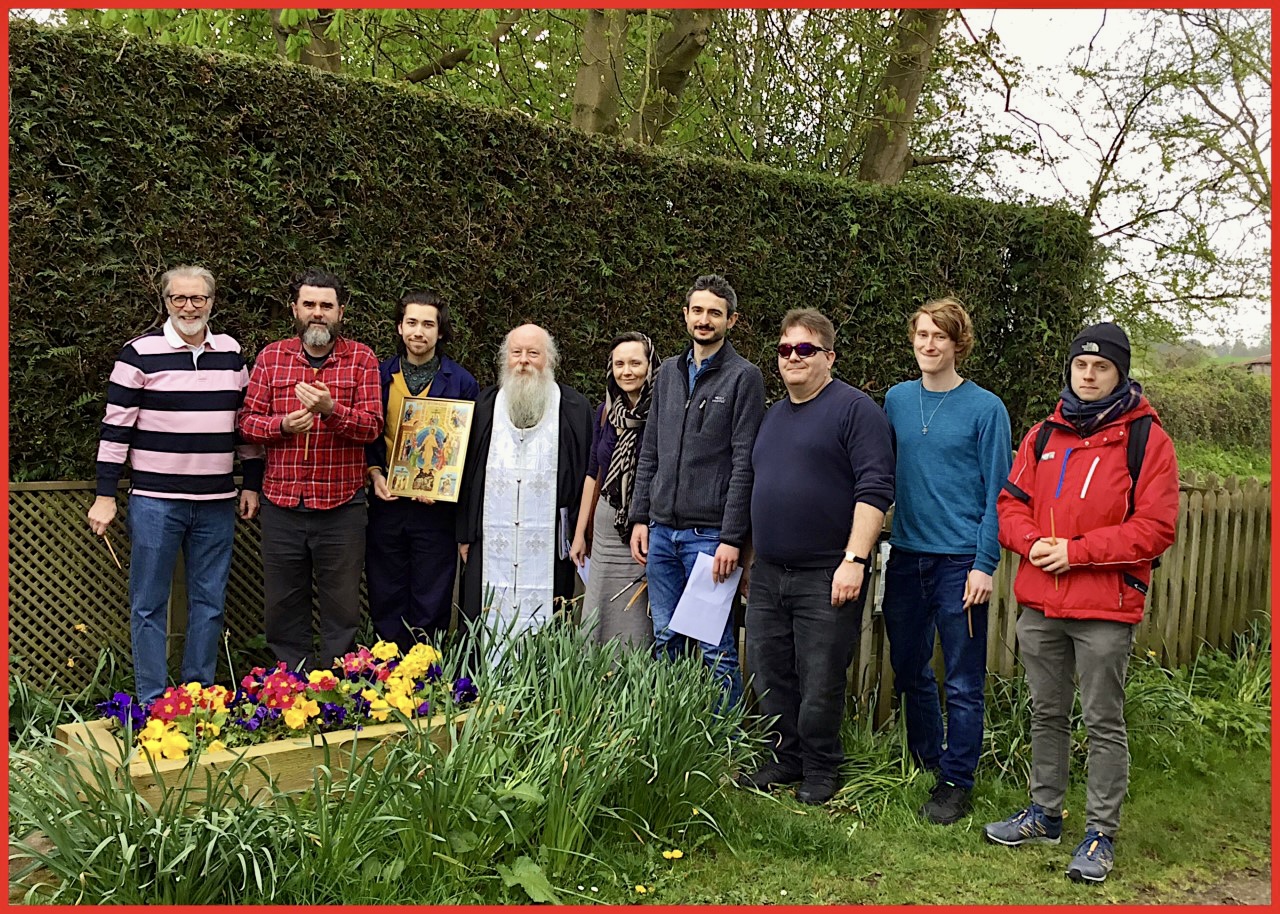
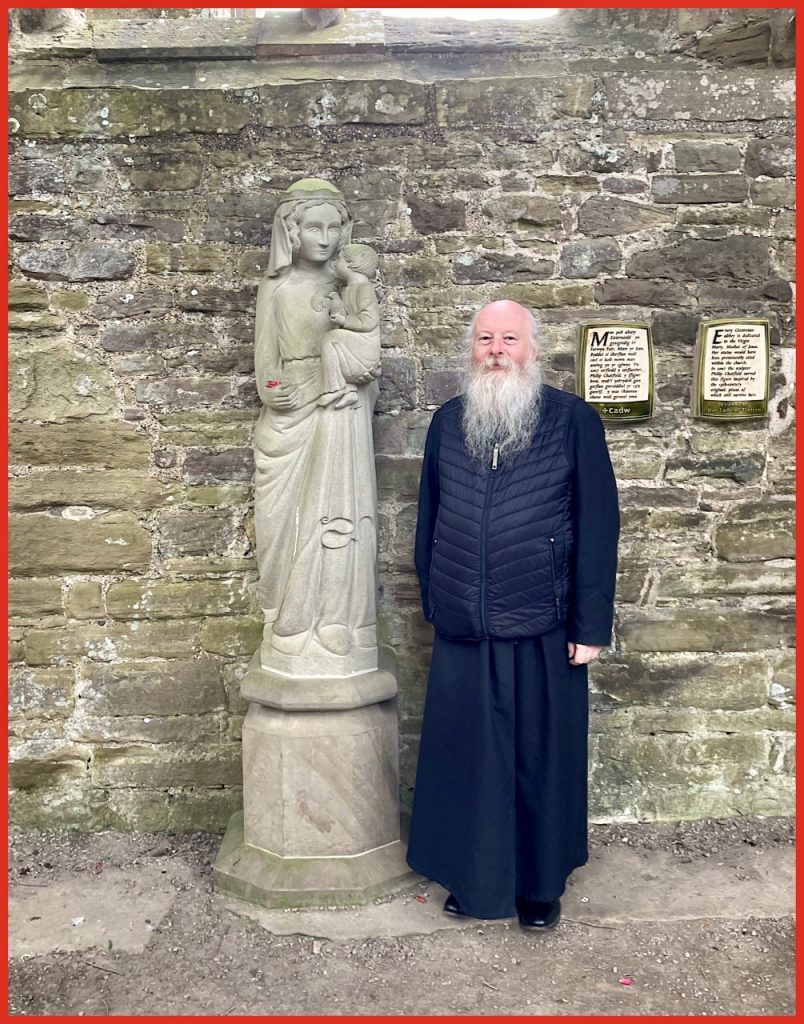 After chanting the Paschal Hours at Nazareth House, our eastward journey took us to Mathern, the place where St Tewdrig died from his battle wounds after leading the Welsh army against the invading Saxons.
After chanting the Paschal Hours at Nazareth House, our eastward journey took us to Mathern, the place where St Tewdrig died from his battle wounds after leading the Welsh army against the invading Saxons. 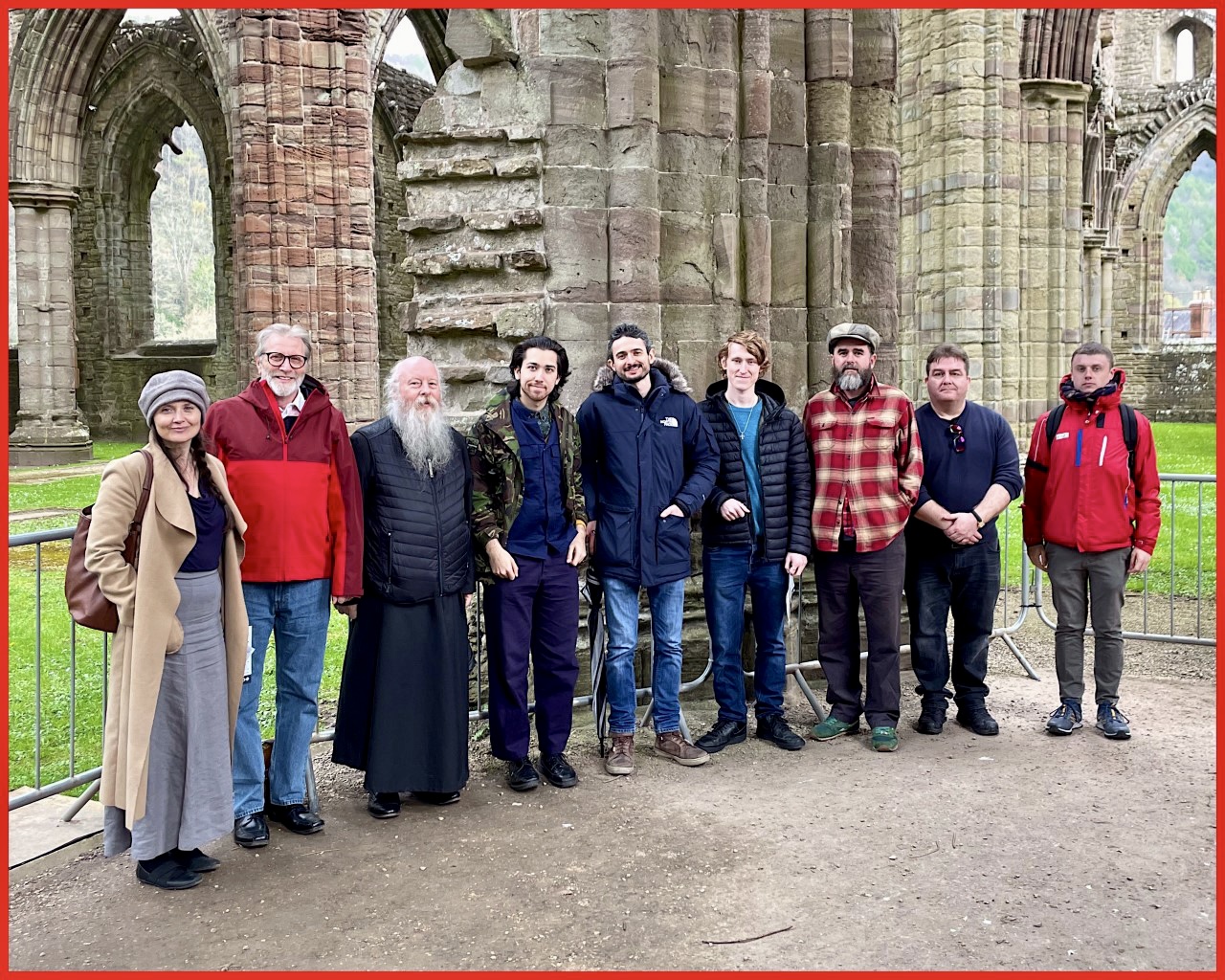
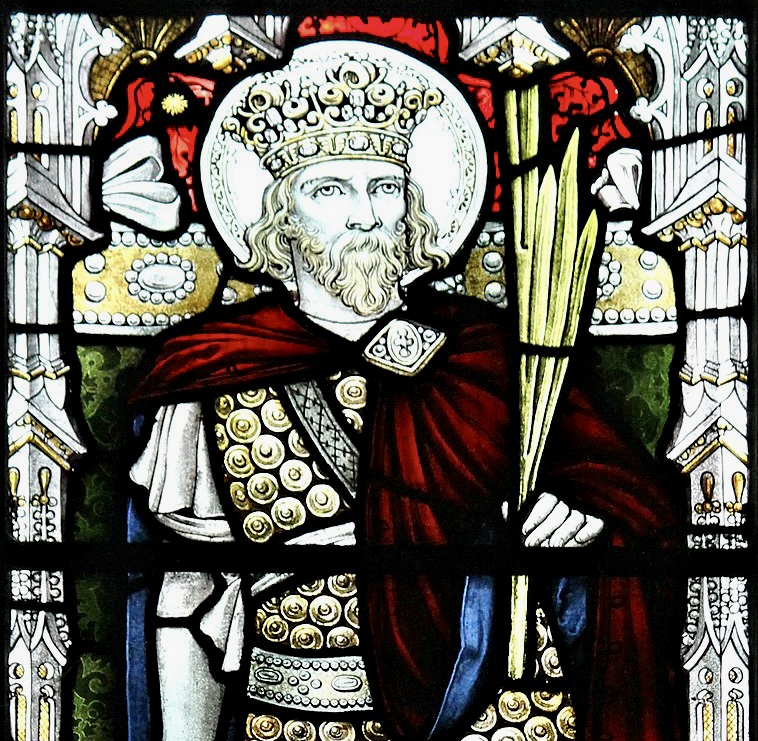
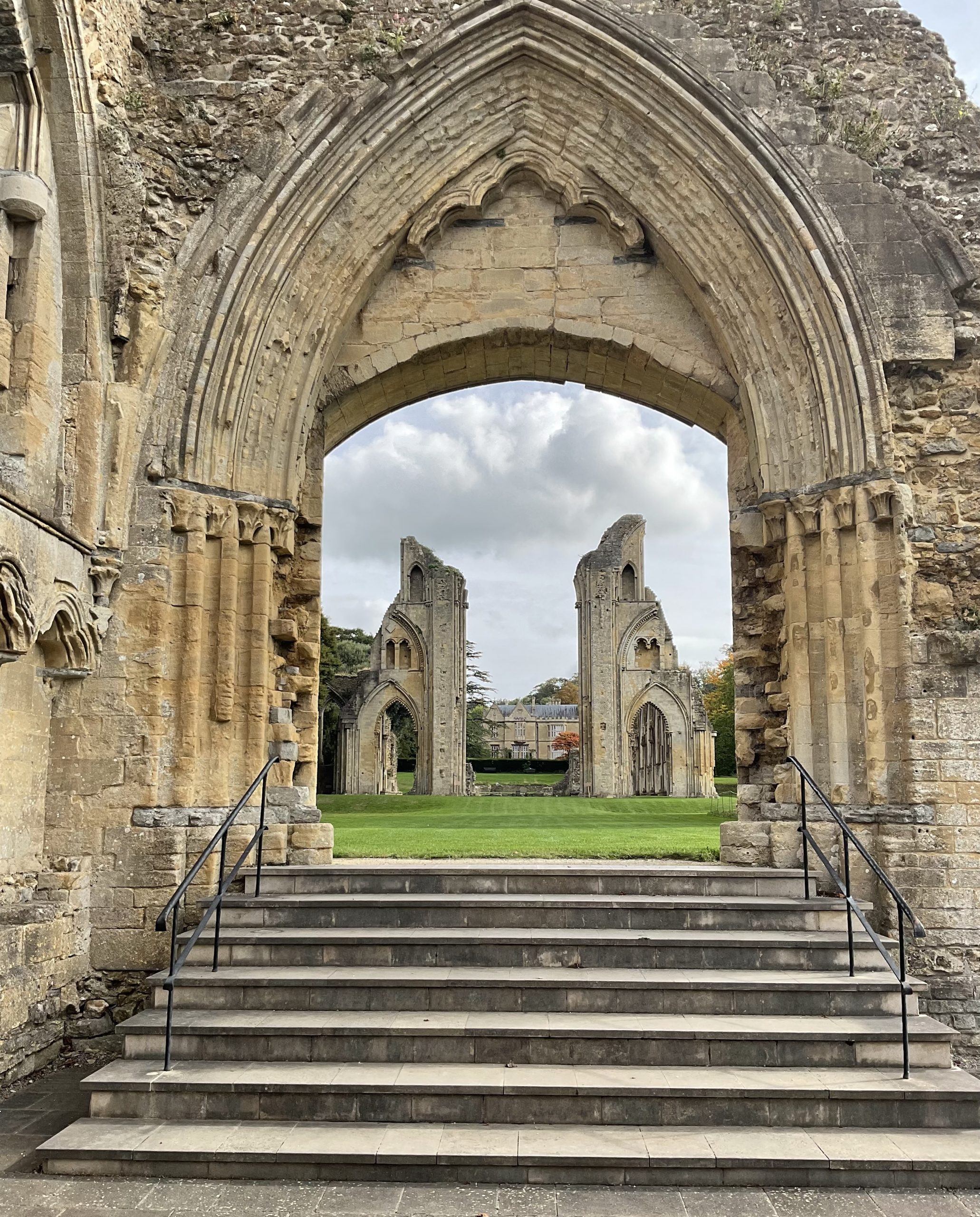
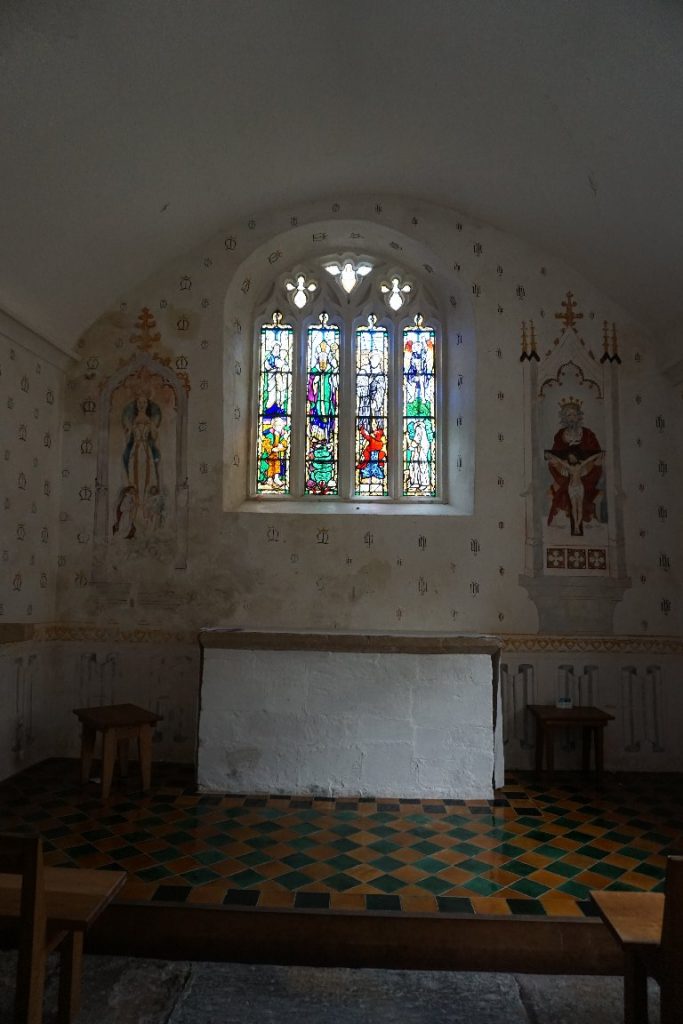
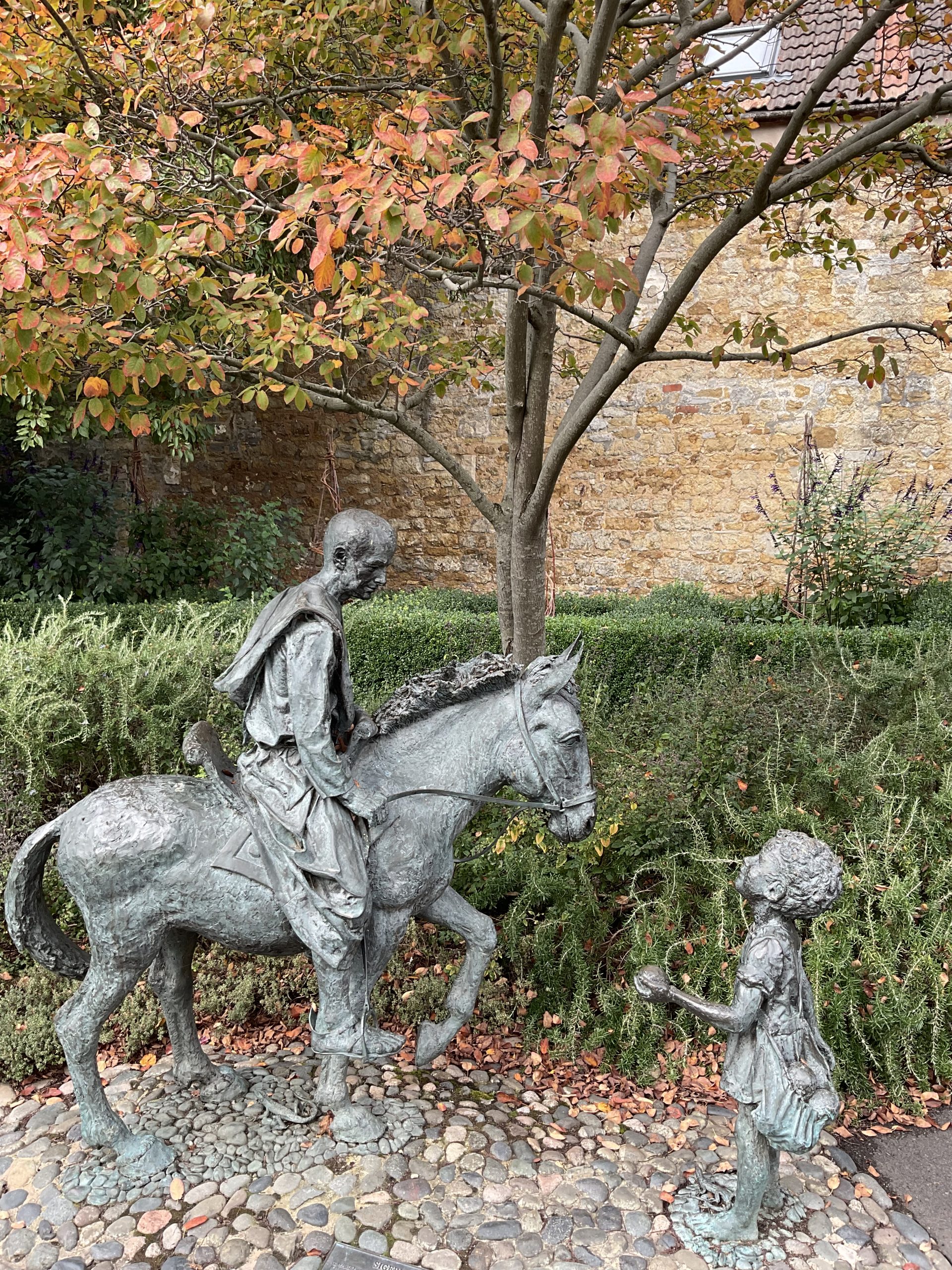
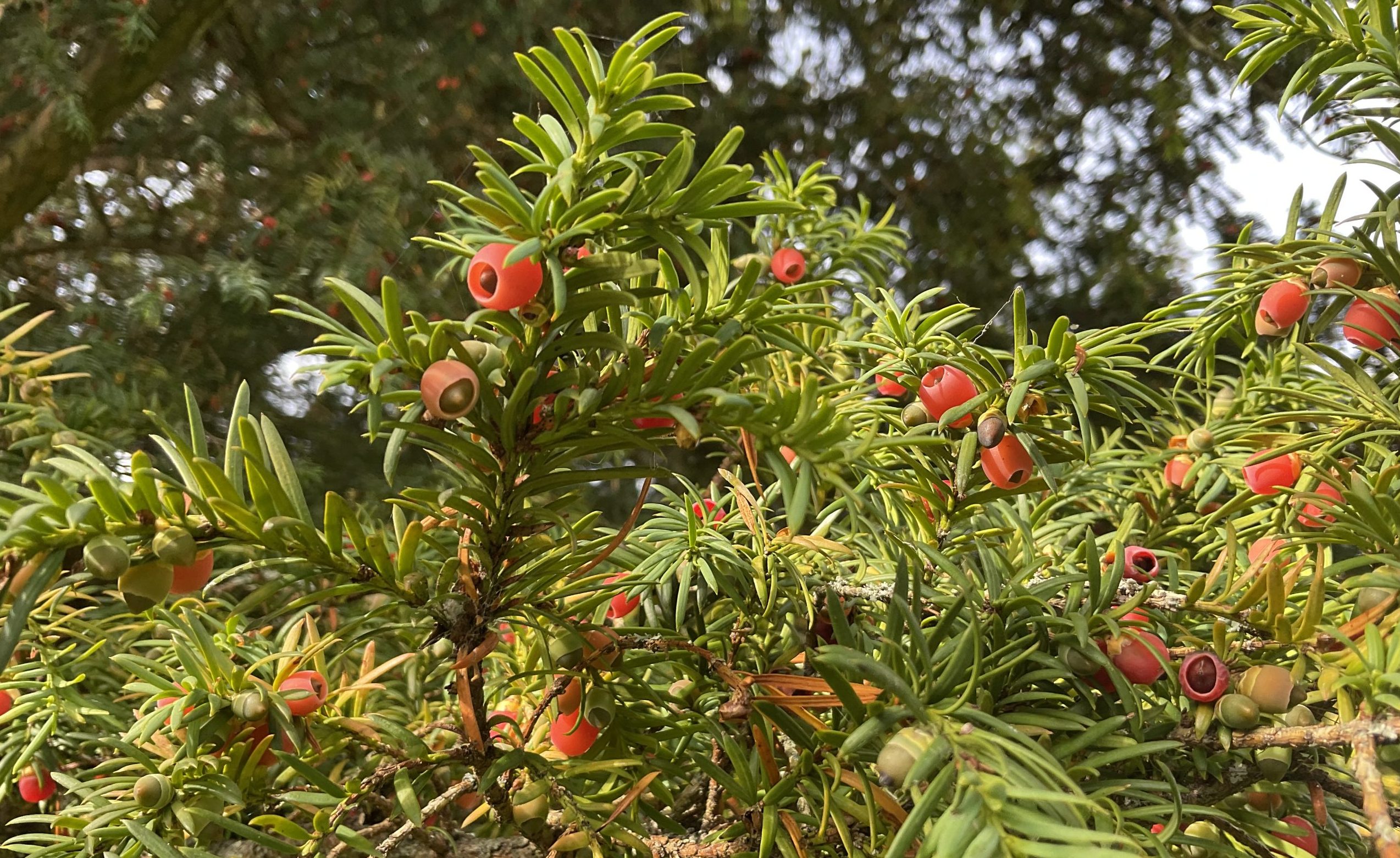
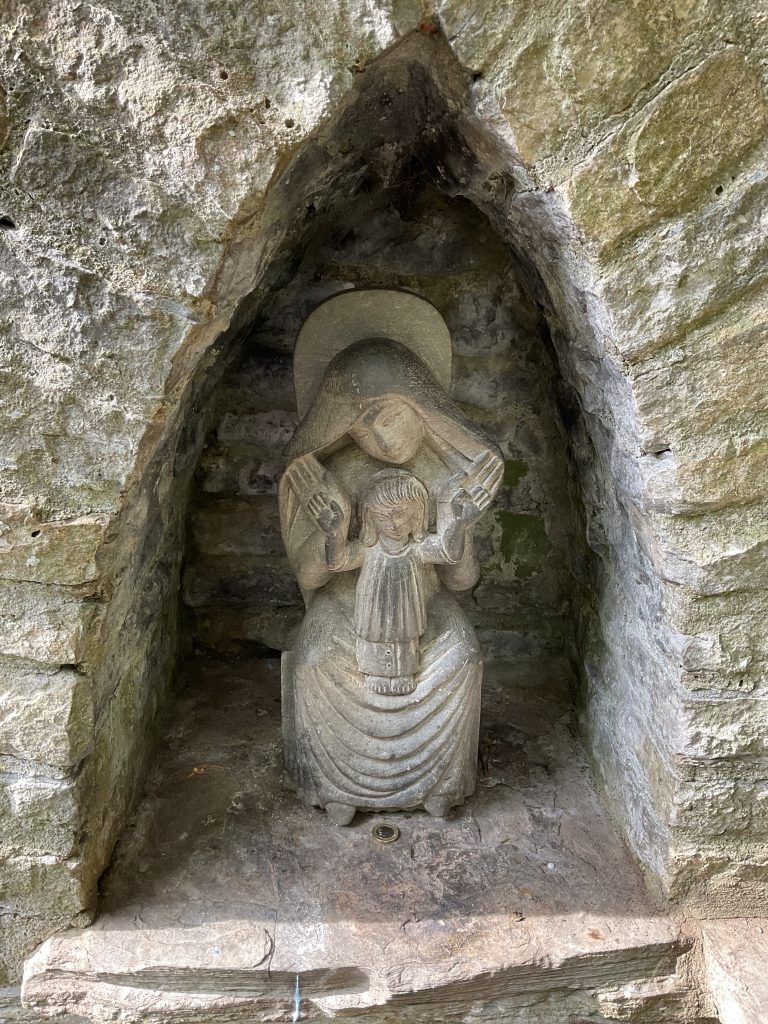
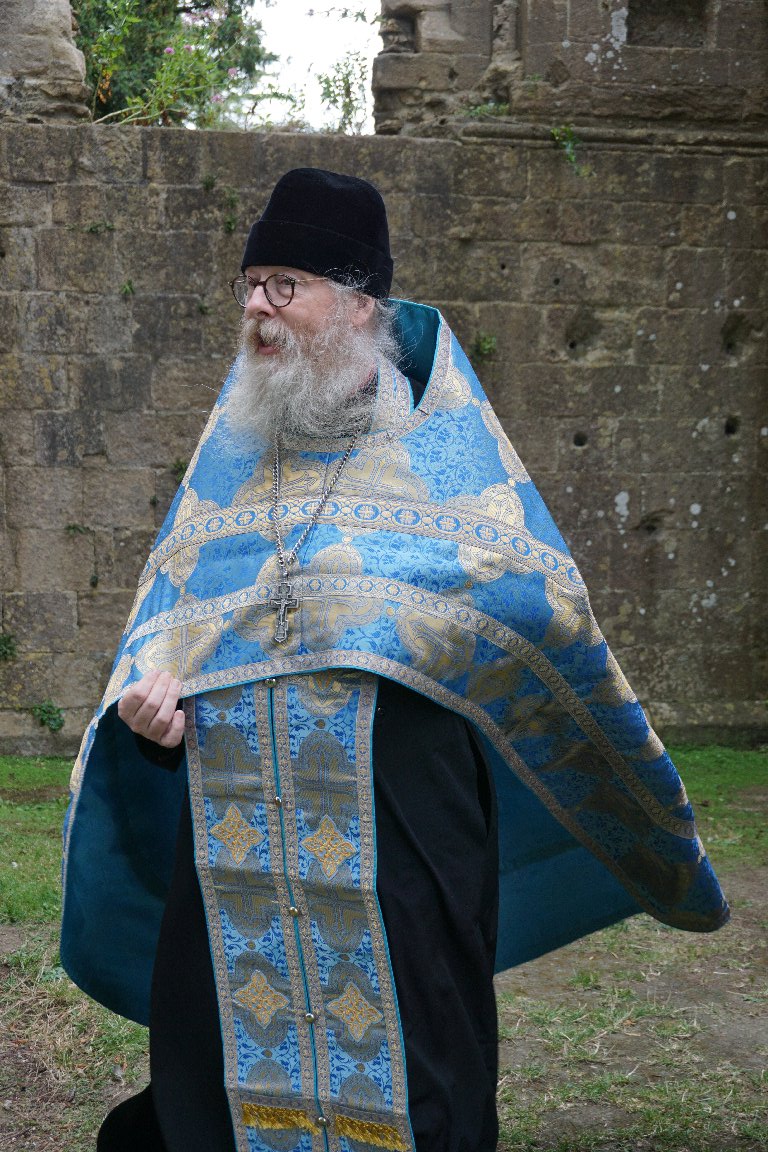
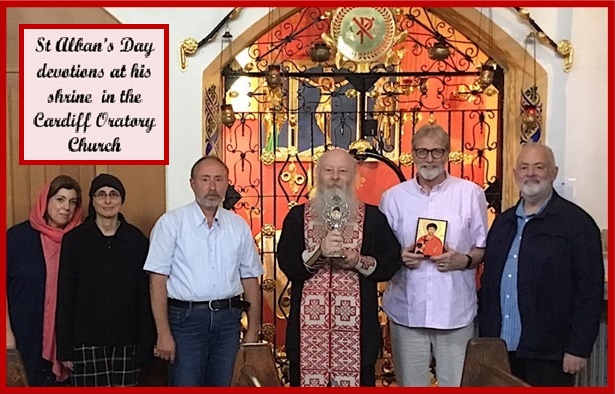

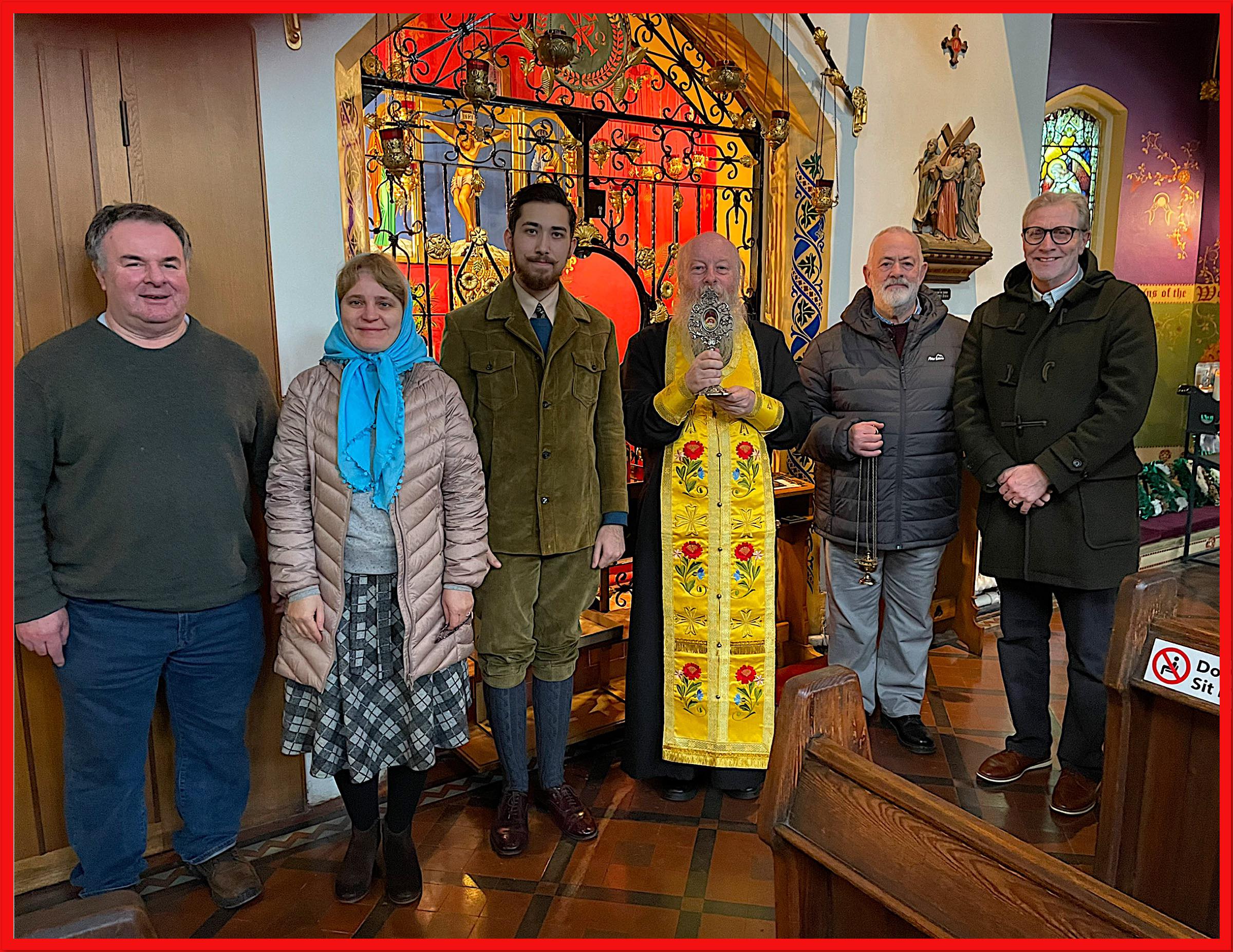







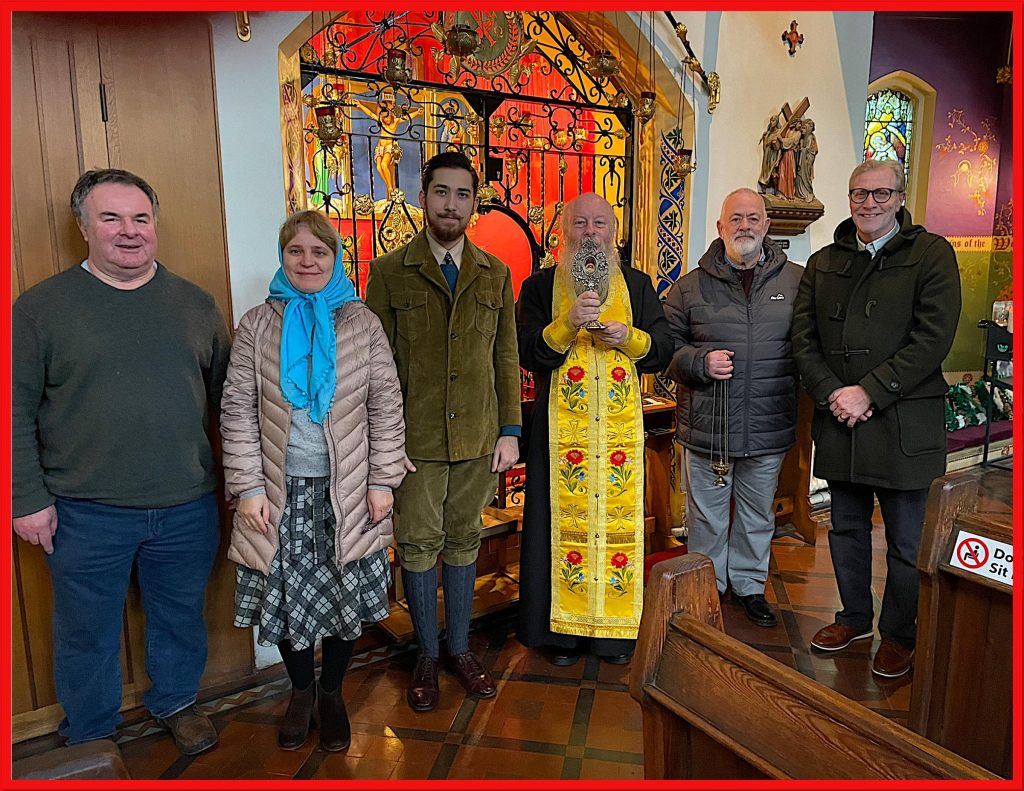
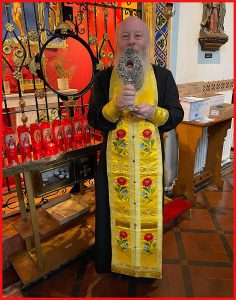 It was a great blessing for the faithful to be able to venerate a relic of St Alban after the dismissal of the moleben, having prayed before the relic enshrined in the feretory.
It was a great blessing for the faithful to be able to venerate a relic of St Alban after the dismissal of the moleben, having prayed before the relic enshrined in the feretory.